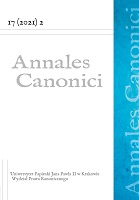Duchowny w świetle księgi pokutnej z Paryża
Clergyman in the light of the penitential book of Paris
Author(s): Marek StorySubject(s): Christian Theology and Religion, Criminal Law, Studies in violence and power, Substance abuse and addiction, Canon Law / Church Law
Published by: Wydawnictwo Naukowe Uniwersytetu Papieskiego Jana Pawła II w Krakowie
Keywords: penitential books; penance; bishop; priest; deacon;
Summary/Abstract: Penitential books which were written in Ireland but were shortly adopted by the whole of Europe are, along sacramentaries, a part of special laws and a means of getting to know the canon law, particularly the criminal law. Their aim was to help confessors unify the way in which penance was administered, as well as how the sacrament of penance and reconciliation was celebrated. The penitential book of Paris which is analyzed in this article, is assumed to have been created around 750 AD and was written on the basis of the oldest penitential book from France i.e. the penitential book of Burgundy (circa 700–725 AD). The article shows that confessors were to analyze the behavior of the penitent – in this case a bishop, priest or deacon – very carefully and responsibly, in order to ensure that they were not a reason of scandals among the faithful of whom they were to take care. Among inappropriate behaviors of the clergymen, the penitential book of Paris speaks in particular about matters related to the protection of the human life, the care of the Holy Sacrament, participation in hunting, overconsumption of alcohol or sexual abuse.
Journal: Annales Canonici
- Issue Year: 17/2021
- Issue No: 2
- Page Range: 143-158
- Page Count: 16
- Language: Polish

